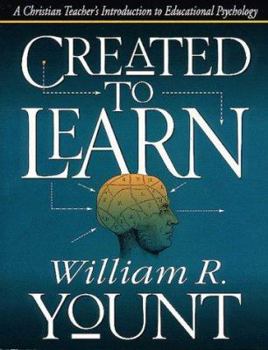Created to Learn
Select Format
Select Condition 
Book Overview
Chapter one establishes a seven-fold approach-the Disciplers' Model-to Christian teaching. This model was developed in response to a question that would not let the author go-'How should I teach so that my learners will grow in the Lord?'
Format:Paperback
Language:English
ISBN:0805412069
ISBN13:9780805412062
Release Date:January 1996
Publisher:B&H Publishing Group
Length:416 Pages
Weight:1.69 lbs.
Dimensions:1.0" x 7.0" x 9.0"
Customer Reviews
4 ratings
A Wholistic approach to Christian education
Published by Thriftbooks.com User , 19 years ago
Through this book, Yount hopes to expand the understanding of educational psychology in the field of Christian teaching. He does this by using a model of teaching that he has called, "The Disciplers' Model." According to his model, there are seven elements: Content Mastery ("letting the Bible speak"), Learner Needs (individual differences and development), Thinking (cognitive and behavioral development and theories), Feeling (empathy and sharing oneself with others), Relating (group dynamics), Growth (maturation and human growth), and Holy Spirit (spiritual growth) (22). His book is devoted to outlining the concepts in each element. Yount believes teachers ought to provide three things for their students: (1) help learners think objectively, (2) help learners unmask, and (3) help learners build relationships (17). Teachers (who are also "disciplers") can see indications of spiritual growth in their students through the learners' reduction of "fleshly behaviors" and development of more "godly behavior" (19). He explains the intricacies of learning-how one learns, how one teaches, how information is cognitively stored, and how the Bible can be taught and integrated into a person's life. The basics of teaching is illustrated in the two principles Yount shares: One principle is to "become great, serve," and the second is to live one's life as an example of Jesus' own life which is "the Son of Man, as a ransom for many." He states that a teacher's place is to serve the learner (43). I found the section on the history of behavioral change interesting. Yount shares that "secondary reinforcers" included such things as "acceptance, hugs, attention, money, grades, prizes, free play, games, and trips" (166), but he never provided practical application of "secondary reinforcers" in Christian education. He provided practical applications in other sections of the book, for example he said that Bible classes are verbally taught and teachers tended to "spoon feed" scripture to their students rather than having them realize the meaning on their own (203). In order for students to find the meaning of scripture for themselves, he suggests writing three questions on 3x5 cards and passing it out to small groups. The groups will study certain passages using the Bible and other resources and answer the questions. Each group then shares their answers and discusses the variations (203). The inclusion of Kohlberg's stages of "moral reasoning" seemed more appropriate for an ethics book rather than one on education. Yount featured the findings of Duska and Whelan in an effort to legitimize his use of Kohlberg's work. Although Duska and Whelan suggest that Kohlberg's theory "fits well" with Christian principles, it was a "stretch" to include it in a book about education and the process of learning. In fact, Yount states that Duska and Whelan's stages "provide helpful filter for various levels of Christian practice" (116). On the other hand, James Fowler'
A Treasury of Teaching Knowledge and Wisdom
Published by Thriftbooks.com User , 21 years ago
After reading this book, I have a deeper understanding of the basic development levels and learning abilities of students. Taking the principles presented by many well-known psychologists and Jesus -- the Master Teacher -- "Created to Learn" is a thorough compilation of information that transformed my approach to teaching based on the learner's needs and abilities. The "Discipler's Model" introduced in this book is a revolutionary, functional basis for monitoring teaching techniques within the classroom for flexible, balanced and productive learning sessions. The book provided priceless insight, application and examples for effective teaching techniques for learners in every level of development -- from birth to seniors. I highly recommend this book to all types of educators from Sunday school teachers and parents to professors and pastors.
Thorough, versatile, distinctively Christian !
Published by Thriftbooks.com User , 26 years ago
Dr. Yount's 'Created to Learn' is a distinctively Christian analysis as well as synthesis of the current trends in Educatinal Psychology and Theories of Learning. It is designed to reach both the Sunday School teachers who are frustrated because their efforts 'do not get through', as well as the Christian Educators who want to perfect or revolutionize their teaching skills. The textbook is well researched and documented, well written, quite comprehensive in its coverage of the curent psychological and philosophical trends of influence, being the result of approximately 20 years of study. The 'Discipler's Model' which is introduced integrates the dynamics of Biblical truth and Holy Spirit guidance with theoretical concepts that have been elaborated by 'laic' authors. Having had the priviledge of taking a course in Educational Psychology with Dr. Yount I can attest that the book is an excellent tool for both undergraduate as well as graduate settings, and a must for the library of any respectable pastor or Christian Educator.
Comparison of Educational Psychology and Christian Teaching
Published by Thriftbooks.com User , 26 years ago
The author intoduces a seven-fold approach to Christian Teaching. He explains the needs of a learner and the basis of all learning from a Christian perspective while contrasting it with secular thinking. A great work for understanding the needs of the learner and how to meet them.





